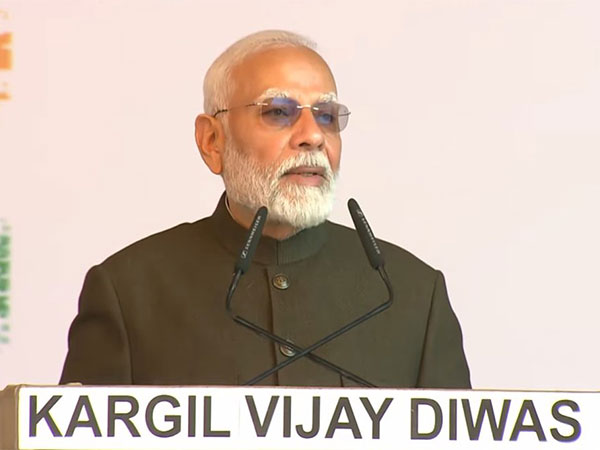PM Modi Highlights Agnipath Scheme During Kargil Vijay Diwas Speech
Prime Minister Narendra Modi highlighted the Agnipath scheme during his address in Kargil on the 25th anniversary of Kargil Vijay Diwas. He emphasized that the scheme aims to keep the Army young and fit, while also discussing reforms and criticizing opposition politicization of national security issues.

- Country:
- India
Prime Minister Narendra Modi emphasized the Agnipath scheme during his address in Ladakh's Kargil on Friday, on the 25th anniversary of Kargil Vijay Diwas. Highlighting the scheme, PM Modi said that the goal of Agnipath was to make the Army young and continuously fit for war. He mentioned that major reforms in the Army have been a long-standing demand.
'The country has felt the need for major reforms in the defense sector for decades. The Army has been demanding this for years, but unfortunately, it was not given enough importance earlier. The Agnipath scheme is also an example of the necessary reforms done in the Army. For decades, discussions have been going on in Parliament and many committees on making the Army young,' PM Modi said. He noted that the average age of soldiers in India being higher than the global average was a concern and Agnipath has resolved it.
'The average age of Indian soldiers being more than the global average has been a cause of concern. This issue has been raised in many committees over the years. However, the will to solve this challenge related to the security of the country was not shown earlier. The country has addressed this concern through the Agnipath scheme,' he said. 'Some people used to think that the Army means saluting politicians and doing parades, but for us, the Army means the faith of 140 crore countrymen. The goal of Agnipath is to make the Army young and fit for war,' PM Modi added.
The Prime Minister also criticized opposition parties for 'politicizing' a 'sensitive issue related to national security.' 'Unfortunately, some people have made such a sensitive issue related to national security a subject of politics. Some people are doing politics of lies for their benefit, even on this reform of the Army. These are the same people who weakened our Army by committing scams worth thousands of crores, who wanted the Air Force to never get modern fighter jets, and who had made preparations to scrap the Tejas fighter plane,' PM Modi said.
PM Modi further emphasized the reforms made in the defense sector over the last decade. 'In the last 10 years, we have made defense reforms a top priority. Due to these reforms, our armies are now more capable and self-reliant!' he said. 'Today, a significant share of defense procurement is being given to the Indian defense industry. Additionally, 25 percent of the research and development budget in defense has been reserved for the private sector. As a result, India's defense production has now exceeded Rs. 1.25 lakh crore,' he added.
Earlier, PM Modi virtually conducted the first blast of the Shinkun La Tunnel project in Kargil. The project includes a 4.1-kilometer-long twin-tube tunnel at an altitude of around 15,800 feet on the Nimu-Padum-Darcha Road to provide all-weather connectivity to Leh, according to a PMO release. Once completed, it will be the highest tunnel in the world, ensuring the swift and efficient movement of armed forces and equipment and fostering economic and social development in Ladakh.
Prime Minister Narendra Modi also paid tribute to the bravehearts who made the supreme sacrifice in the line of duty during the 1999 Kargil War. He laid a wreath at the Kargil War Memorial in Drass, Ladakh, on the 25th Kargil Vijay Diwas. Kargil Vijay Diwas, observed annually on July 26, commemorates the success of Operation Vijay in 1999, during which Indian forces successfully reclaimed strategic positions in the Kargil sector of Jammu and Kashmir that had been infiltrated by Pakistani soldiers and terrorists.
(With inputs from agencies.)
ALSO READ
NIA Sets Record with 100% Conviction Rate in 2024: A New Era in National Security
Biden's Block on Nippon Steel Deal Sparks U.S. National Security Debate
Biden Blocks Nippon Steel's Acquisition of U.S. Steel: A National Security Stand
Biden Halts Nippon Steel's Controversial Acquisition of U.S. Steel: National Security at the Forefront
Biden Blocks Nippon Steel's Acquisition of U.S. Steel, Citing National Security










